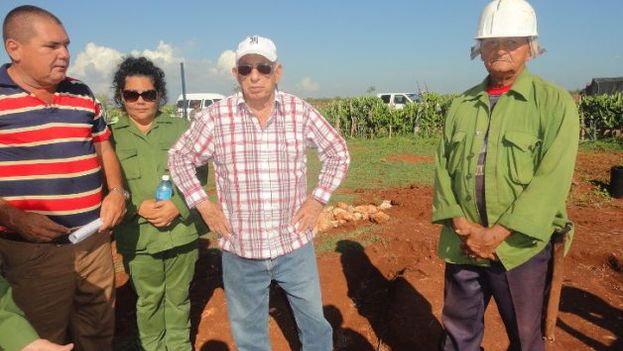
![]() 14ymedio, Caridad Cruz, Cienfuegos/Miami, 28 September 2017 — A strong smell of urine permeates the Russian-style apartment while Margot cooks a couple of pork steaks. “They are boar [the male pig], that’s why the smell,” she explains. Getting food in Cienfuegos, a city that was only affected by the edges of Hurricane Irma, has become an odyssey, according to its residents.
14ymedio, Caridad Cruz, Cienfuegos/Miami, 28 September 2017 — A strong smell of urine permeates the Russian-style apartment while Margot cooks a couple of pork steaks. “They are boar [the male pig], that’s why the smell,” she explains. Getting food in Cienfuegos, a city that was only affected by the edges of Hurricane Irma, has become an odyssey, according to its residents.
“There’s a man who sells pork from a pushcart and we buy it. What are we going to do if every time we want to buy something in the market, the lines are gigantic?” says Margot as she tries to remove the bad smell from the meat with some basil and a little ‘complete seasoning’ that she scrapes out of a nearly empty jar.
“They deceived me, I spent my monthly pension on ten pounds of stinking meat that there is no choice but to eat it,” she laments.
The authorities of Cienfuegos have imposed a severe rationing after Hurrican Irma. Eggs, vegetables and meat are regulated and you can only buy a certain amount per person “to avoid speculation.”
“The unrationed eggs have all been taken to Villa Clara because there they don’t even have a pot to piss in,” says the clerk at a point of sale in Calzada de Dolores, one of the main arteries of the city.
The alternative to chicken eggs are duck and quail eggs, which are sold in the Ministry of Internal Commerce stores, but it’s enough to check the stores to confirm that in many of them there are no eggs of any kind.
“There are no eggs in the whole city. It’s because of the hurricane,” another shop assistant explains.
In order to buy fruits or vegetables, the situation is similar. In the markets where the prices are controlled by the state, people line up from early in the morning, while in the uncontrolled markets and from the pushcarts, prices are skyrocketing.
“The state is to blame for this situation,” says Margot. “Television announces that all the countries are sending aid, but they use it only for Havana, which is where people throw themselves into the streets [to protest],” she explains.
Although the official media did not make reference to the protest of 13 September in Havana sparked by the absence of electricity and water, the videos of the demonstration have gone viral through the ‘weekly packet’.
“As long as people remain silent, things are going to stay the same, but nobody wants to be cannon fodder,” he laments.
Although the damages in the province were minimal, compared to the north of Villa Clara, Ciego de Avila and Camagüey, the city was without electricity for more than 96 hours due to failures in the local thermo-electrical plant.
In the midst of this situation, Cuban Vice President Jose Ramon Machado Ventura, 86, along with the Communist Party’s staff in the territory, toured some of the province’s agricultural sites where, according to the local press, he got “the commitment” of the farmers to “produce more food.”
In the Hard Currency Collection Stores (TRD) – as the state chain of outlets is officially called – the availability of meat, poultry and cans of fish has been reduced in recent weeks. “Before the cyclone, there was almost nothing,” said Magalis, a customer at the La Casa Mimbre store. “What they have left is at exorbitant prices, which no worker can buy.”
Cuba reduced imports by more than 1.5 billion dollars in the first half of the year, which in the opinion of economists has had a direct effect on the worsening of shortages in state stores.
“They recently opened a market here near (La Casa Mimbre), but between the lines, the little assortment and the high prices it’s not worth going,” she says.
“There is an Italian cheese that I suppose is the worst of what’s available in the world’s markets, but here a single kilogram costs 20.05 CUC (roughly $20 US), more than an entire month’s salary,” she protests.
